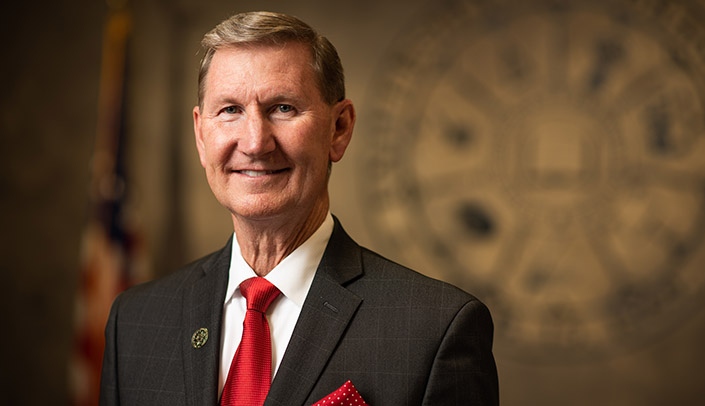Joined by students and business leaders, University of Nebraska President Ted Carter on Wednesday testified in support of a new scholarship program that would expand access for Nebraska college students pursuing degrees in high-demand areas like engineering, math, health care and information technology.
The Nebraska Career Scholarships program, proposed by Gov. Pete Ricketts and included in the Appropriations Committee’s preliminary budget, would invest a total of $16 million over the next four years. Half of that would go to students across the NU system, with the remaining $8 million split between the state and community colleges. The scholarship proposal is the university’s highest legislative priority for 2020.
Carter thanked the governor, appropriations chairman John Stinner, vice chairwoman Kate Bolz and the full committee for making student access and workforce development a priority for the state.
“More scholarships means more access for our young people,” Carter said. “Not just the 51,000 students of the University of Nebraska, but students at our community and state colleges, and future generations of students who are hoping to turn the dream of a college education into reality.”
Carter noted that in the coming years, Nebraska will have 34,000 annual openings in high-demand, high-skill, high-wage jobs like engineering, IT and nursing. The majority of those — more than two-thirds — will require at least an associate’s degree. Needs exist across both rural and urban parts of the state.
Greater investment in financial aid, Carter said, would put Nebraska’s public higher education institutions in a stronger position to recruit and retain talent and grow Nebraska’s workforce. Financial aid could also help attract individuals who have completed some college but have not earned a degree — including some 290,000 Nebraskans — back to college.
Carter commended leaders from government, education and business for working together to address Nebraska’s workforce challenges.
“We have an opportunity, together, to turn Nebraska’s ‘brain drain’ into ‘brain gain,'” he said.
University of Nebraska-Lincoln mechanical engineering major Alex Sukup, a native of Norfolk, told senators that even though the university’s tuition is well below the peer average, higher education is still a major investment for most students and families.
“From a student’s perspective, I can tell you every amount of financial aid makes a difference,” said Sukup, who is a regents scholar at UNL. “Scholarships help get students in the door, stay on track to a degree, and graduate with less debt as we begin our careers.”
Julissa Bakken, a nursing student at UNMC, told senators that the scholarship she had while she was completing nursing prerequisites allowed her to spend more time on her studies and with her family. That flexibility became especially important during her sophomore year, when her stepfather had a stroke and suffered cardiac arrest.
During that time, Bakken, who grew up in Valley, spent most nights at a hospital in Omaha, doing homework in the cafeteria while her stepfather rested. Given her mom’s busy schedule, Bakken would stay overnight at her parents’ house, wake up early the next day, get her two younger siblings ready and drive them to school before returning to Lincoln for her own classes.
“During this stressful time, the only thing that put my mind at ease was knowing that I had a scholarship that allowed me to focus on my family and education rather than focusing on affording my education,” she told senators.
Now, as she nears graduation, Bakken noted it can take hours to search through nursing job openings — evidence that “the nursing shortage is real, and it is not expected to improve anytime soon.”
Also testifying in support of the Nebraska Career Scholarships program was Bryan Slone, president of the Nebraska Chamber of Commerce & Industry. Nebraska’s workforce challenges, Slone said, are “the challenge of the decade.”
But efforts like the Nebraska Career Scholarships can help the state win the 50-state competition for talent, he said.
“We’re poised to do something special.”
